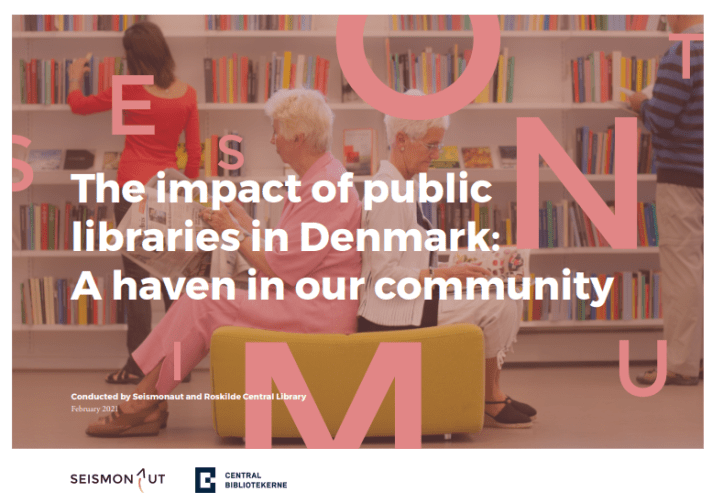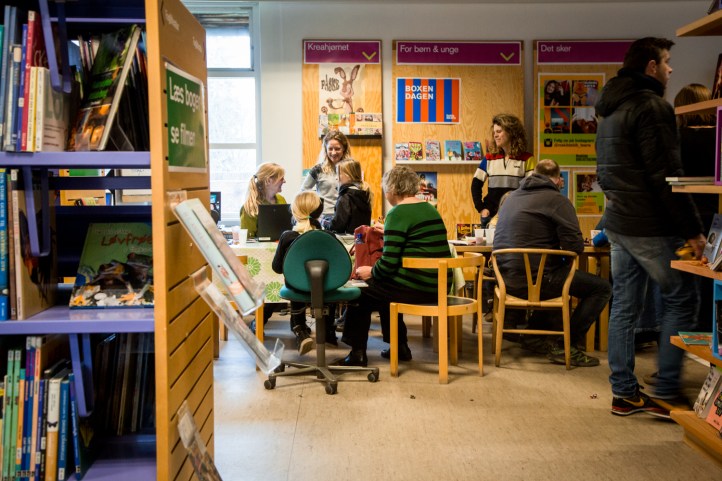This piece is a rewrite of a chronical I wrote for national Danish newspaper Jyllands-Posten. Link to the original piece (in Danish and behind paywall): https://jyllands-posten.dk/debat/kronik/ECE13157234/folkebiblioteket-er-frirummet-hvor-vi-kan-genfinde-naervaeret-og-evnen-til-fordybelse/

Our ability to immerse ourselves is closely linked to our ability to learn and thrive and it is challenged by increasing media consumption and expectations of constant availability. The public library provides a confident haven for contemplation and presence in return, but it requires both financial priorities and an expansion of the conversation about the library’s role in society if that position is to be developed and strengthened in the future.
When was the last time you took the time to really immerse yourself in something? Lose yourself completely in a book, a piece of music or be present with your own thoughts? If it’s been a while, you’re not alone. For many of us, everyday life feels like a hectic marathon and the battle for our attention rages from there, challenging our ability to immerse ourselves and be properly present in our own lives.
Both privately and professionally, we meet demands for constant availability, often at the same time: A text message ticks into your mobile and your partner expects an answer regarding the dinner agreement tonight, you must answer in the parent group’s thread on the schools’ communication platform, your teen writes in Messenger and the work email overflows with information that you may, or may not have to deal with before your next meeting starts in a little while. At the same time, Facebook sends you notifications that someone has commented on your post with photos of the kids, and Instagram entices with a much-needed dopamine supplement for your next welcome skip action.
Everything happens simultaneously and work and private life flow together. According to Danish Broadcasting Corporation’s Media Research, citizens in Denmark spend an average of seven hours a day on the media. We are ‘always on’ and available. The tech giants tempt us around the clock with notifications over the phone – which has gradually become a physical extension of our body – and they know exactly what they are doing, with some of the world’s leading behavioral scientists behind the algorithms. The attention economy has moved all the way into the bedroom, where Netflix is threatening our sex lives.
Lack a immersion has consequences
For people of all ages, the ability for contemplation and presence is essential and the lack of the same has consequences. The American professor of neuroscience, Andrew Huberman, has done research on how the brain is able to learn new things. His work shows that the brain is developed to create “fixed connections” (ie learning) early in life, while it becomes more demanding to create new “fixed connections” later on when we get older.
However, it is possible for our brain throughout life to be great at learning something new, but it requires that we are able to focus our attention. In other words: the ability for contemplation and presence is a key to learning. Huberman therefore warns that we spend too much of our mental attention on passive input – for example, youtube videos, social media feeds, news sites and other media, which we let our eyes slide over into a lazy mental wide angle. We need to train and maintain our ability to immerse ourselves – otherwise we will have a hard time learning something new.
Lack of immersion and presence not only affects our learning capacity. The younger generation is bombarded with “Just do it” orders from the advertising industry and many young people are plagued by the feeling of never living up to societies expectations. Author Christian Hjortkjær focuses on this in the book ‘Insufficient – why the new morality makes young people mentally ill’; an entire generation has grown up with the glossy images of social media, where reality is distorted through a filter of perfection and the individual can quickly feel inadequate
It can be difficult to navigate when both your circle of friends, family and employer expect you to be ‘on’ – and it is difficult not to become addicted once you have logged in.
The consequence for many young people as well as the elderly is often stress and mental dissatisfaction and a search for something that can answer our unmet need for presence, adequacy and contemplation.
The public library offers a unique haven
The responsibility of turning off the phone and being present is our own, but many needs to seek new rooms and keys to break the habit. In the midst of the attention-seeking and impulse-driven society, the public libraries lie as diverse oases that invite immersion and togetherness without commercial purpose or economic barrier to use. If you ask the Danish citizens themselves, the answer is that they experience the libraries as a haven in a busy everyday life. Just being present in a physical library room contributes to the experience of taking a break, taking time for yourself and each other. This is shown by the recent national survey ‘’The impact of public libraries in Denmark: A haven in our community”, conducted by Roskilde Central Library and Seismonaut.

“To me, it feels as if the library is an offer with a heart. An offer that wants the best for me and where I am not a product or a customer” states a 39-year-old male respondent in the survey. The public library is not interested in getting you through the store as quickly as possible so that a new customer can drive the plastic card through. The library invites to slow time; time to read and time to be present. The staff helps you to seek knowledge about what you are curious about and you meet people with something on their mind and who offer a way out of the algorithms’ echo chambers. In school, children learn to read, but in the library they find the joy of reading and the community of sharing it with others.
In Denmark, the public library is the country’s most used cultural institution measured in visitor numbers, but the study takes a deeper step and unfolds the impact of the public library that has previously lacked valid empirical basis – namely the public library’s enormous importance and potential as a performative, democratic space, where the very fact that we are together across all paths of life and is shared about things in a non-commercial community, creates meaning and belonging to society, maybe even forms the glue between all citizens in Denmark. As an 18-year-old female respondent expresses in the survey: “There are many different people who share the place. The books are shared. It unites a society”
Change the language for the impact of the library
The study puts people at the center of the debate about the importance of the public library to uncover the value and effect we cannot see in the spreadsheet. And the result and the approach are relevant when we focus on our declining ability for contemplation and presence: the public library is for the citizens a haven that allows for a much-needed break; where one takes time for oneself and each other and experiences contemplation and presence. For some it is about calm and concentration, while for others it is about togetherness with the children, fellow students, or the other newspaper readers.
The public library is not a goal in itself, but a catalyst into some of our societal challenges and opportunities and it is in this context that we must discuss its role and task.
We need to put the citizens at the center of the debate about the role and impact of the public library in society and start a more nuanced conversation about how we continue to develop and safeguard the democratically valuable social infrastructure that the public libraries constitute for thousands of citizens every day. day. And back up that conversation and those ambitions with sustainable priorities of the libraries’ municipal operating budgets, so that staff and skills are put in place to implement them. Our public library is an investment – not an expense.
Thanks for reading – will be happy to hear your thoughts on this

